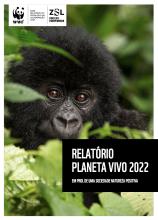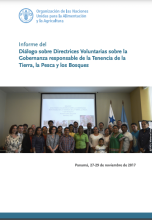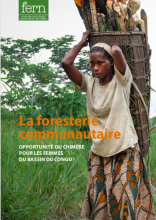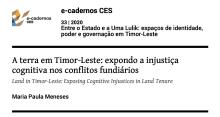/ library resources
Showing items 37 through 45 of 73379.Enfrentamos, hoje, as emergências duplas e interligadas das mudanças climáticas induzidas pelo ser humano e da perda de biodiversidade, ameaçando o bem-estar das gerações atuais e futuras.
Históricamente América Central es una región con importantes niveles de inequidad en la distribución y uso de los recursos naturales.
Cette note thématique rédigée à l’initiative de Fern, a été élaborée dans le cadre de l’initiative CoNGOs (Collaboration d’ONG en faveur de moyens de subsistance durables et équitables dans les forêts du bassin du Congo) qui plaide pour une « foresterie
Em 2020, a FAO deu início ao projeto “Apoio ao Programa de Fortalecimento do Cooperativismo na Agricultura Familiar - TCP/BRA/3702/C2”, por meio do escritório de projetos sul da FAO no Brasil, em parceria com a Secretaria de Agricultura e Abastecimento do Estado do Paraná (SEAB) e IDR-Paraná.
O presente trabalho propõe-se a problematizar a questão agrária no continente africano em geral correlacionada com a experiência específica de Guiné-Bissau a partir do período neoliberal.
Assente na análise de vários conflitos pelo acesso à terra em Timor-Leste, este artigo busca compreender a íntima relação existente entre o moderno direito de propriedade e as estratégias coloniais-capitalistas de apropriação de recursos, uma relação geradora de injustiças.
O planeta Terra vive uma emergência climática e a necessidade de soluções e ações se tornou ainda mais urgente com a crise mundial ocasionada pela pandemia da Covid-19. As relações entre o modelo de produção do agronegócio, o desmatamento, a destruição da biosfera e o aquecimento global, entre ou
Pagination
Land Library Search
Through our robust search engine, you can search for any item of the over 64,800 highly curated resources in the Land Library.
If you would like to find an overview of what is possible, feel free to peruse the Search Guide.







